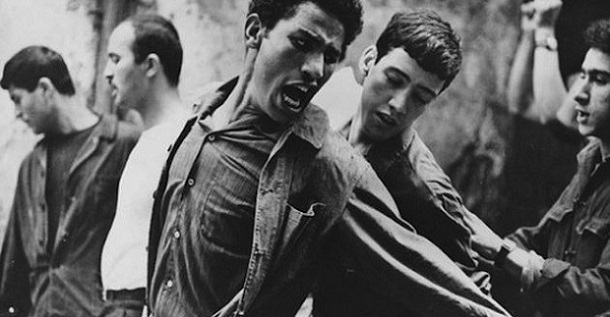
Note — This post is by Alexis Parchell, a senior in the Honors College at Oakland University majoring in Art History. Students in my course, International Relations on Film, are contributing posts to the blog reflecting on the movies we are watching in class and the ideas those films are helping us to think about. Alexis’ piece is presented here with minor editing.
The 1966 film The Battle of Algiers has no qualms about its political message. Filmed only four years after Algeria’s war for independence ended, the film follows the National Liberation Front (FLN) and its campaign of terrorism in the city of Algiers. Saadi Yacef and Samia Kerbash, who play El-Hadi Jaffar and Fatiha, are two members from the actual FLN who recreated their wartime activities for the film.
Shot in an Italian neorealist style, The Battle of Algiers gives viewers a documentary-like account of the acts of guerrilla warfare committed by the FLN and the counter-terrorism efforts of French forces, led by paratrooper commander Col. Mathieu, a composite character based on several different historical figures.
In the film, we are introduced to Ali La Pointe, who becomes a leading member of the FLN after his recruitment Jaffar. His recruitment, an attempted assassination of a French police officer, alludes to the future means taken by the FLN to end French rule over Algeria.
Throughout the rest of the film, the FLN’s members carry out different instances of urban terrorism. The first acts of FLN violence are against French security officers in the city, the most visible agents of the oppression of the Algerians the FLN were claiming to represent.
Despite their efforts to control the situation by controlling the population, like installing checkpoints and aggressively searching Algerian Arabs, the local French authorities were unable to stop the attacks. We see a French police commander take matters into his own hands as he and fellow Europeans detonate a bomb outside home of a suspect in the casbah, killing innocent civilians in the process.
With the FLN vowing of vengeance, this bombing sets in motion the deliberate targeting of civilians that is the characteristic feature of terrorism.
The FLN then go from targeting French police and soldiers to targeting civilian areas. The first set of these attacks target a café, a milk bar full of dancing teenagers, and an airline office. Many innocent people are killed, mimicking the deaths of the innocent people in the first bombing of the casbah. As the film shows, more civilians die in further FLN attacks, at a racetrack, and on the streets of the city’s European quarter.
In the city of Algiers, the means by which the FLN attempts to free their country from colonial rule are defined as terrorism, where the violence largely targets innocent people rather than soldiers. Although their acts are successful in causing terror, do the FLN’s methods work in advancing their war of independence? Does Algeria’s eventual independence justify this violence?
The FLN’s methods do attract the attention of the United Nations, even though in the end they are not given support by the organization.
The Algerian movement for independence wasn’t out of the ordinary. The mid-twentieth century was characterized by fights for independence from the European powers. Even within Algeria, the FLN’s aim of gaining freedom was not isolated in Algiers, but was waged throughout the country as Algerians fought against French power.
As Americans, I think that many of us support movements for freedom and independence. However, I am also someone who grew up during the “War on Terror” and I have seen acts of terrorism like 9/11, the November attacks in Paris, and most recent Brussels attacks.
I find it hard to sympathize with the killing of innocent people when there are non-violent alternatives that are even more effective. Watching The Battle of Algiers, I agree with the legitimacy of a desire for independence, but the acts of violence enacted by the FLN only served their movement to a point.
So, do the ends justify the means? For me, no.
I really liked how you tied it all together in the end. Relating it to more recent terror attacks gives a perspective to those not around during this period of unrest in Algeria. Great work!